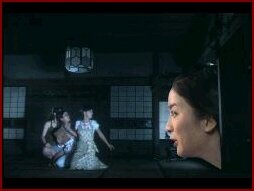|
Hausu
My favorite line ever from an online review of a cult movie is as follows: "Slaughtered Vomit Dolls is not for everyone." Not only is it admirable for being refreshingly direct, but also for how it so clearly provides the guidance that we consumers depend on from such reviews. It's the type of informed counsel that makes you truly grateful that the internet exists, especially if you're one of those people who might otherwise have considered purchasing Slaughtered Vomit Dolls as a Mothers Day gift. In the spirit of those words, I would like to begin this review by stating that Hausu, the 1977 debut feature from Japanese director Nobuhiko Obayashi, is not for everyone. However, if you are one of those people whom Hausu is for, I think that you will find it not just fascinating, but addictive. I myself have now seen it five times, and it's a testament to it's uniqueness that each time I watch it I find myself surprised anew at just how strange it is. It's as if it contains too much that's beyond the normal frame of reference for the brain to adequately retain it all. It is without question one of the most unique horror films that I have ever seen.
Obayashi came to Hausu from a background in television advertising, and, in making it, he not only employs all of the tricks of that trade, but also turns many of them on their head. This is a film in which no fraction of any one frame escapes being stylized to within an inch of its life. In addition to working with a woozy pallet of saturated and uniformly unnatural colors (not to mention a chaotic sound design), Obayashi uses every special effect technique available at the time, in concert with a large repertoire of "naive" optical effects not typically seen since the early talkies, to create layers of visual and aural signals that constantly bombard the viewer at every level from sub to superliminal. While this can at times come off like a first-time director simply showing off, the film is far from an empty exercise in style. Hausu is simply energized by too much passion (and, perhaps, rage) for there not to be a vision - and heart - behind its madness. Obayashi, at least in his early directing years, seemed to be drawn to fantastic stories that centered on school-aged protagonists, especially those that played on themes of teenage angst (his other films include the manga adaptation Drifting Classroom, Exchange Students and The Girl Who Conquered Time), and Hausu is no exception, following the fate of a close knit group of seven teenaged schoolgirls. Of these seven, only the ethereally beautiful Oshare is provided with any kind of back-story - or character, for that matter. The remaining six are simply an assortment of types, each paired down to a descriptive nickname and one corresponding signature behavior: Mack (for "stomach") overeats; Fanta is prone to romantic daydreams; Melody plays piano; Kung Fu practices Kung Fu and has her own action theme music, etc. Collectively these girls inhabit a world straight out of a seventies Saturday morning cereal commercial, one in which people rise to greet the day with arms outstretched to the sun as cartoon rainbows play across the horizon to the strains of treacly soft rock. As Obayashi presents it, you wouldn't be at all surprised if one of Syd and Marty Kroft's psychedelic football mascots from PuffnStuff or Lidsville were to bound into frame at any moment. Oshare's life outside of the group, however, is presented a little differently, though in no less cavity-promoting terms. Hers is a world of movie-fuelled romanticism with the kitsch level pushed to belligerent extremes (think Douglas Sirk on eleven): Beyond the balcony of her father's high-rise flat, a permanent artificial sunset stretches across the sky like a glorious, lurid bruise, and, as we watch Oshare, all of the camera's means of idealizing dewy young womanhood - gauzy soft focus, halo lighting, slow motion shots of fan-blown hair - are amped to the level of the grotesque. Taken together, the world that's presented in the first section of Hausu is one in which a malignant, over-ripe greeting card sentimentality has poisoned the very atmosphere. And, given that, it should come as no surprise that rottenness lurks just around the corner - or, at least, just a short train ride away. Things start to turn when Oshare, heartbroken over the prospect of her widowed father marrying a creepily serene younger woman named Ryoko, reaches out to her beloved dead mother's sister, an aunt whom she hasn't seen for many years. That aunt has remained in the family home, alone, honoring a decades old promise to wait for the man to whom she was engaged, even though, as we have seen, he was long ago killed in the war that took him away. (In keeping with the psychotically chipper tone of Hausu's first act, the flashback of the aunt's tragic story is played out as a silent era film while, on the soundtrack, the girls coo inanely over how cute and quaint it all looks.) The aunt in return invites Oshare and her friends to come stay at the remote family house for the holiday. Quickly after the group of girls arrives at the house it becomes apparent that, not just something, but everything isn't right. The aunt, they eventually learn, has long ago died and become a ghost whose vengeful spirit has infected the very house itself. Furthermore, in order to maintain itself, the house must literally devour any virgin girl who steps within it. It is at this point that Hausu resoundingly turns against its first half, and the opening scenes' creepy yet chaste fetishizing of the young girls gives way to an explosive sexuality so uncontainable that it literally permeates and animates the physical environment that they inhabit. It is also at this point that Hausu takes on the structure of a conventional modern horror film, with the girls being picked off one by one by a variety of gory means. But the nature of those means, given that it's the house itself that is implementing them, combined with the delirious, candy colored nightmare of their presentation, makes those sequences anything but conventional. The scene in which we watch Melody getting eaten, and then digested, by a grand piano is probably the most memorable, but there are a number of others that equal it in terms of their combined horror and absurdity. Obayashi here performs a neat (and, to my mind, never repeated) trick by drawing on the queasy, hallucinatory imagery of Italian horror directors like Argento, while replacing their languid, dreamy pacing with the sugar rush velocity of a particularly demented Saturday morning cartoon. The result is as intoxicating as it is overwhelming. Hausu, perhaps surprisingly, dates very well. Despite its surface appearance, it manages to escape itself being 1970s kitsch by presciently recognizing that kitsch for what it was in its own time. From that vantage point, it can treat those treacly feel good excesses, not with nostalgic affection or condescending dismissal, but as a telling symptom of something malignant underneath. It may just be wishful thinking, but I like to believe that it's no coincidence that Hausu came out in the year commonly associated with the birth of punk - that, though not apparent on the surface, hidden within it is a mischievous punk sensibility. After all, what better symbol of everything that punk rose up against than the Smiley Face? If Obayashi did not officially count himself among punk's practitioners, he at least attacked that symbol and everything it stood for with a bile and passion equal to theirs. So, if you think that Hausu is for you, that's the good news. The bad news is that, as of this writing, it's only legitimately available as a German DVD without English subtitles. That shouldn't be too much of a deterrent, however, because its simple story and emphasis on visuals make it a perfect example of the type of film that's easy to enjoy without understanding the spoken language. Still, given the ready availability of so many old Japanese genre titles on the market, it's somewhat astonishing that no one has seen fit to give a film as ripe for cult appreciation as Hausu a proper American release. Mind you, it's no Slaughtered Vomit Dolls, but it still deserves to be seen. Just as you deserve to see it.
- Todd Stadtman 10/31/07
|
||
|
All text content � Copyright 2007 Todd Stadtman. All rights reserved. |













